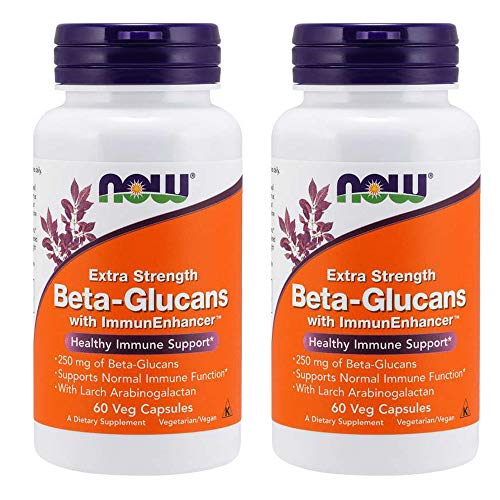
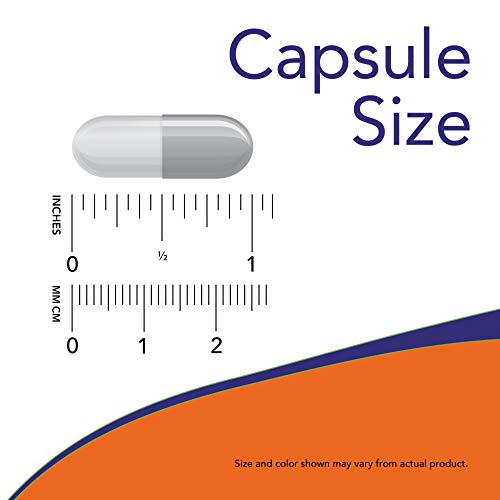
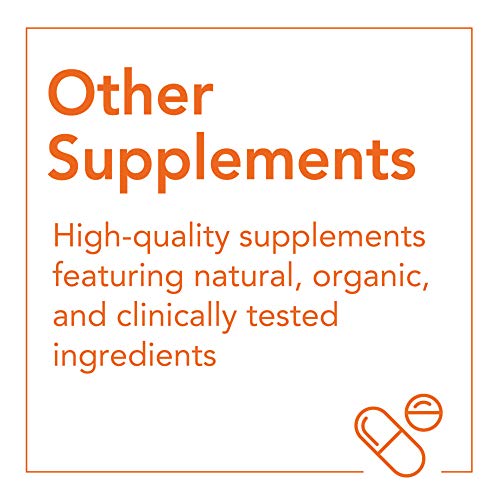
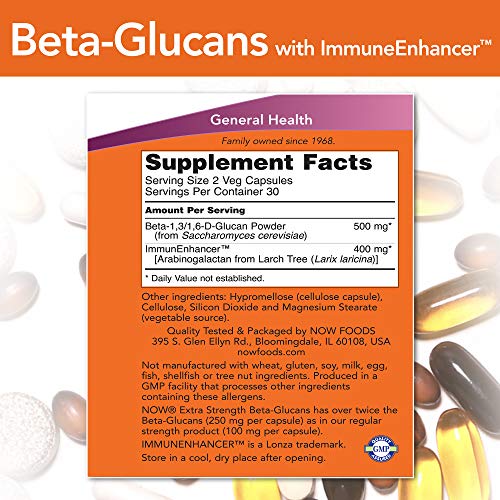
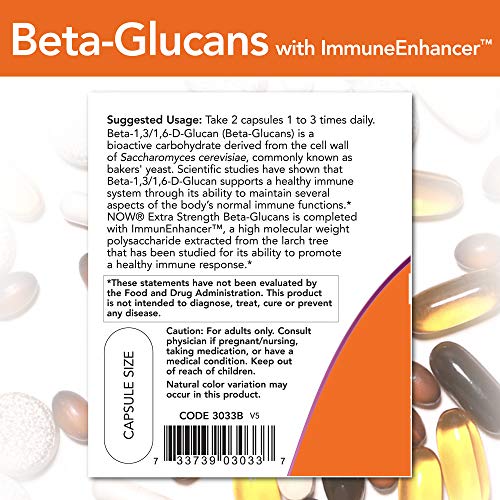
NOW Immune Defense Supplement - Supports Healthy Immune Function, GMP Quality - 60 VegiCaps (2 Pack)


Triticum Vulgare (Wheat) Gluten
Medium RiskTriticum vulgare (wheat) gluten is a protein derived from wheat that functions primarily as a binding agent in various food and cosmetic products. It provides texture and elasticity, making it a common ingredient in baked goods and some personal care items.
Sustai Insights
Wheat gluten offers functional benefits such as enhancing product texture and acting as a stabilizer. However, it poses moderate allergenic risks, particularly for individuals with gluten sensitivity or celiac disease. Environmental concerns are low, with no significant pollutant potential noted. Regulatory bodies do not impose major restrictions, but products must be clearly labeled for consumer safety. Overall, the risk level is assessed as medium. Safe usage practices should be observed, especially for sensitive populations, and alternatives like pea protein or other plant-based binders may be considered.
Galactoarabinan
Low RiskGalactoarabinan is a polysaccharide obtained from the larch tree and is commonly used in cosmetic and personal care products. It acts as a humectant and thickening agent, contributing to product texture and moisture retention.
Sustai Insights
Galactoarabinan serves functional benefits as a humectant and thickening agent, enhancing product texture while retaining moisture. It is biodegradable and derived from renewable sources, supporting sustainability. Health risks are low, with no significant concerns regarding carcinogenicity, allergies, or reproductive toxicity. Environmental risks are minimal, as it does not contribute significantly to pollution or bioaccumulation. Regulatory status is favorable, with no current restrictions. Overall, this ingredient is assessed as low risk, making it a suitable choice in formulations.
Magnesium Stearate
Low RiskMagnesium stearate is a magnesium salt of stearic acid, commonly used as a lubricant and anti-caking agent in pharmaceuticals and cosmetic products. It helps in the manufacturing process by preventing ingredients from clumping together and ensuring even distribution in formulations.
Sustai Insights
Magnesium stearate is recognized for its functional benefits as a lubricant and anti-caking agent, enhancing product stability. It is considered low risk regarding health concerns, including carcinogenicity and allergenic potential, with no significant environmental hazards reported. Regulatory bodies, including the FDA, have not imposed major restrictions, supporting its safe use in various applications. Recommended usage levels are typically low, maintaining safety in formulations. Overall, the ingredient is assessed as low risk, with no significant adverse health or environmental impacts identified.
Egg
Low RiskEgg is the entire content of chicken eggs, commonly used as an ingredient in various products for its nutritional and functional properties.
Sustai Insights
Eggs are known for their functional benefits, including serving as a binding agent and providing protein. They are typically sustainably sourced and biodegradable. Health risks are considered low, with minimal concerns regarding carcinogenicity, allergies, or reproductive toxicity. Environmental risks are also low, with no significant pollutant potential. Regulatory bodies do not impose current restrictions on egg usage. Overall, the risk level is low, and safe usage practices should be observed, though alternatives like plant-based substitutes may be considered for those with allergies.
Hydroxymethylcellulose
Low RiskHydroxymethylcellulose is a synthetic polymer derived from cellulose, primarily used as a thickening agent, emulsifier, and film-forming agent in various personal care and cosmetic products. It enhances texture, stability, and moisture retention, making it suitable for use in creams, lotions, and gels.
Sustai Insights
Hydroxymethylcellulose serves effectively as a thickener and stabilizer, contributing to product texture and moisture retention. It is considered low risk for health concerns such as carcinogenicity, allergies, and reproductive toxicity. Environmentally, it is not classified as a pollutant or bioaccumulative, aligning with regulatory standards in multiple regions. Overall, its risk level is assessed as low, with no significant adverse effects reported. Safe usage practices should be followed, and while alternatives exist, hydroxymethylcellulose remains a suitable choice in formulations.
Milk
Low RiskMilk is whole milk from cows, primarily used as a source of nutrition and an ingredient in various food products. It contains proteins, fats, carbohydrates, vitamins, and minerals, contributing to its functional benefits in culinary applications.
Sustai Insights
Milk provides essential nutrients and serves as a versatile ingredient in food, enhancing flavor, texture, and nutritional value. It is generally regarded as safe with low concerns for carcinogenicity, allergies, or developmental toxicity. Environmental risks are minimal, and regulatory bodies impose no significant warnings. However, individuals with lactose intolerance or dairy allergies should exercise caution. Overall, milk is assessed as low risk based on current scientific consensus.
Cellulose
Low RiskCellulose is a natural polysaccharide derived from plant cell walls, primarily used as a thickening agent, stabilizer, and emulsifier in cosmetic formulations. It is known for its ability to improve texture and consistency in products.
Sustai Insights
Cellulose serves as an effective thickening and stabilizing agent, enhancing product texture while being biodegradable and derived from renewable sources. Health risks are minimal, with low concerns regarding carcinogenicity, allergies, and reproductive toxicity. Environmental impacts are also low, as cellulose does not contribute significantly to pollution or bioaccumulation. Regulatory agencies have not issued restrictions on its use. Overall, cellulose presents a low risk profile, making it a suitable ingredient choice in cosmetics.
Galactoarabinan
Low RiskGalactoarabinan is a polysaccharide obtained from the larch tree and is commonly used in cosmetic and personal care products. It acts as a humectant and thickening agent, contributing to product texture and moisture retention.
Sustai Insights
Galactoarabinan serves functional benefits as a humectant and thickening agent, enhancing product texture while retaining moisture. It is biodegradable and derived from renewable sources, supporting sustainability. Health risks are low, with no significant concerns regarding carcinogenicity, allergies, or reproductive toxicity. Environmental risks are minimal, as it does not contribute significantly to pollution or bioaccumulation. Regulatory status is favorable, with no current restrictions. Overall, this ingredient is assessed as low risk, making it a suitable choice in formulations.
Magnesium Stearate
Low RiskMagnesium stearate is a magnesium salt of stearic acid, commonly used as a lubricant and anti-caking agent in pharmaceuticals and cosmetic products. It helps in the manufacturing process by preventing ingredients from clumping together and ensuring even distribution in formulations.
Sustai Insights
Magnesium stearate is recognized for its functional benefits as a lubricant and anti-caking agent, enhancing product stability. It is considered low risk regarding health concerns, including carcinogenicity and allergenic potential, with no significant environmental hazards reported. Regulatory bodies, including the FDA, have not imposed major restrictions, supporting its safe use in various applications. Recommended usage levels are typically low, maintaining safety in formulations. Overall, the ingredient is assessed as low risk, with no significant adverse health or environmental impacts identified.
Egg
Low RiskEgg is the entire content of chicken eggs, commonly used as an ingredient in various products for its nutritional and functional properties.
Sustai Insights
Eggs are known for their functional benefits, including serving as a binding agent and providing protein. They are typically sustainably sourced and biodegradable. Health risks are considered low, with minimal concerns regarding carcinogenicity, allergies, or reproductive toxicity. Environmental risks are also low, with no significant pollutant potential. Regulatory bodies do not impose current restrictions on egg usage. Overall, the risk level is low, and safe usage practices should be observed, though alternatives like plant-based substitutes may be considered for those with allergies.
Triticum Vulgare (Wheat) Gluten
Medium RiskTriticum vulgare (wheat) gluten is a protein derived from wheat that functions primarily as a binding agent in various food and cosmetic products. It provides texture and elasticity, making it a common ingredient in baked goods and some personal care items.
Sustai Insights
Wheat gluten offers functional benefits such as enhancing product texture and acting as a stabilizer. However, it poses moderate allergenic risks, particularly for individuals with gluten sensitivity or celiac disease. Environmental concerns are low, with no significant pollutant potential noted. Regulatory bodies do not impose major restrictions, but products must be clearly labeled for consumer safety. Overall, the risk level is assessed as medium. Safe usage practices should be observed, especially for sensitive populations, and alternatives like pea protein or other plant-based binders may be considered.
Hydroxymethylcellulose
Low RiskHydroxymethylcellulose is a synthetic polymer derived from cellulose, primarily used as a thickening agent, emulsifier, and film-forming agent in various personal care and cosmetic products. It enhances texture, stability, and moisture retention, making it suitable for use in creams, lotions, and gels.
Sustai Insights
Hydroxymethylcellulose serves effectively as a thickener and stabilizer, contributing to product texture and moisture retention. It is considered low risk for health concerns such as carcinogenicity, allergies, and reproductive toxicity. Environmentally, it is not classified as a pollutant or bioaccumulative, aligning with regulatory standards in multiple regions. Overall, its risk level is assessed as low, with no significant adverse effects reported. Safe usage practices should be followed, and while alternatives exist, hydroxymethylcellulose remains a suitable choice in formulations.
Milk
Low RiskMilk is whole milk from cows, primarily used as a source of nutrition and an ingredient in various food products. It contains proteins, fats, carbohydrates, vitamins, and minerals, contributing to its functional benefits in culinary applications.
Sustai Insights
Milk provides essential nutrients and serves as a versatile ingredient in food, enhancing flavor, texture, and nutritional value. It is generally regarded as safe with low concerns for carcinogenicity, allergies, or developmental toxicity. Environmental risks are minimal, and regulatory bodies impose no significant warnings. However, individuals with lactose intolerance or dairy allergies should exercise caution. Overall, milk is assessed as low risk based on current scientific consensus.
Cellulose
Low RiskCellulose is a natural polysaccharide derived from plant cell walls, primarily used as a thickening agent, stabilizer, and emulsifier in cosmetic formulations. It is known for its ability to improve texture and consistency in products.
Sustai Insights
Cellulose serves as an effective thickening and stabilizing agent, enhancing product texture while being biodegradable and derived from renewable sources. Health risks are minimal, with low concerns regarding carcinogenicity, allergies, and reproductive toxicity. Environmental impacts are also low, as cellulose does not contribute significantly to pollution or bioaccumulation. Regulatory agencies have not issued restrictions on its use. Overall, cellulose presents a low risk profile, making it a suitable ingredient choice in cosmetics.
Elevate your wellness with Beta-Glucans with ImmunEnhancer™! This powerful immune defense supplement harnesses the natural benefits of beta-glucans and larch tree extract to support a healthy immune response, perfect for the health-conscious consumer.
- Immune Support: Beta-1,3/1,6-D-Glucan promotes normal immune function, helping you stay resilient year-round.
- Unique Formula: Enriched with ImmunEnhancer™, a potent polysaccharide derived from larch, designed to enhance your immune system's response.
- Quality Assurance: Manufactured in a GMP-certified facility, ensuring top-notch quality and safety standards for every VegiCap.
- Plant-Based: Contains no artificial additives and is free from common allergens like gluten, dairy, and soy, making it suitable for various dietary needs.
- Easy to Use: Take one VegiCap daily with a meal for optimal absorption, making it a convenient addition to your health routine.
Packaged in the USA by a family-owned company since 1968, this supplement reflects a commitment to sustainability and community integrity.
Subscribe & Save with Sustai
- Best Price Guarantee: Always enjoy the lowest prices on sustainable home essentials.
- No Surprises: We’ll notify you before shipping. No hidden fees, ever.
- You’re in Charge: Change, pause, or cancel your subscription anytime with ease.
- Eco-Friendly Deliveries: Our grouped shipments mean less packaging and lower emissions.
Join us on a sustainable journey. Special offers for a limited time! Prices and promotions may change.
Recommended Products
Elevate your wellness with Beta-Glucans with ImmunEnhancer™! This powerful immune defense supplement harnesses the natural benefits of beta-glucans and larch tree extract to support a healthy immune response, perfect for the health-conscious consumer.
- Immune Support: Beta-1,3/1,6-D-Glucan promotes normal immune function, helping you stay resilient year-round.
- Unique Formula: Enriched with ImmunEnhancer™, a potent polysaccharide derived from larch, designed to enhance your immune system's response.
- Quality Assurance: Manufactured in a GMP-certified facility, ensuring top-notch quality and safety standards for every VegiCap.
- Plant-Based: Contains no artificial additives and is free from common allergens like gluten, dairy, and soy, making it suitable for various dietary needs.
- Easy to Use: Take one VegiCap daily with a meal for optimal absorption, making it a convenient addition to your health routine.
Packaged in the USA by a family-owned company since 1968, this supplement reflects a commitment to sustainability and community integrity.

You can have at most 2 Sustainable Steals products in your cart
Customer Reviews
Customers’ View
Customers appreciate the immune support and quality of the Beta-Glucans dietary supplement, noting its effectiveness in promoting overall wellness. Many users report positive experiences, highlighting that it helps prevent illnesses and supports upper respiratory health. As one customer shared, they noticed significant health improvements, including maintaining low cancer markers over the years. Reviewers also commend the product's quality, with many expressing trust in the brand's consistent performance and value for money. Additionally, customers value the product's formulation, which is free from common allergens, aligning with health-conscious choices. Overall, this supplement is well-regarded for its natural ingredients and reliable immune defense support.
AI-generated from the text of customer reviewsThis product has no reviews yet.




